| |
Agility and admin...
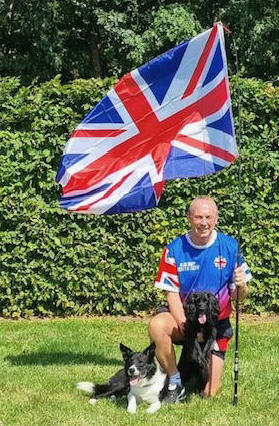 There's
a lot more to competing overseas than simply qualifying for Agility Team GB.
It's just the start of a lot of paperwork and special training, and who would
know more about what has to be done than Alan Bray, who has represented GB
seven plus times with several dogs. This year he attended the Senior Open
Agility World Championships (SOAWC) in Belgium with two dogs of different sizes
and came away with a medal or two. This report was originally written for Ace
Canine, one of Alan's sponsors. There's
a lot more to competing overseas than simply qualifying for Agility Team GB.
It's just the start of a lot of paperwork and special training, and who would
know more about what has to be done than Alan Bray, who has represented GB
seven plus times with several dogs. This year he attended the Senior Open
Agility World Championships (SOAWC) in Belgium with two dogs of different sizes
and came away with a medal or two. This report was originally written for Ace
Canine, one of Alan's sponsors.
Preparations for
me, Ticket and Ticita to go to 2024 SOAWC began months before we left for Belgium. There were admin issues
such as finding a dog-appropriate hotel near the venue, planning travel and
booking Channel Tunnel passage and breakdown cover plus passports, travel
insurance for humans and for the dogs which had to be done way in advance as
well as
making arranging for our dogs left at home. And all of this is a huge cost
running into thousands of pounds paid for by running more training days over the
winter - all before the show had even begun.
Thank goodness, I have my lovely wife Louise with her excellent
organisational skills to help. She also acts as my groom at the shows
which is nice as we all need looking after!
Pre-show
prep
One of the first things we do when going to an international show is to create a
spreadsheet with all the things that need to be done including the mountain of
paperwork and legal documents required, such as worming and rabies vaccination
which all need to be up to date. In addition, now we needed the Animal Health
Certificate to get into and out of GB which is a real pain but has to be
professionally produced and verified. Otherwise you aren't going anywhere!
Then there was the question of
clothing, both for competing and social events. You need to be ready for hot or
cold or dry or wet weather - first aid for both us and our dogs along with all
the dog accessories needed and, of course, their food and supplements including
our Ace Canine powders as well as water and energy milk.
I did the travel arrangements, sorted out the motor
and prepared the dog food Finer by Nature 50/50
for both dogs travelling with us as
well as those being looked after by familyat home. I bagged the food for each
dog in sandwich bags with tags specifying morning and evening feeds. It's a huge
job for ten dogs and takes me ages to do.
Louise organises the hotel reservations and arranges
for the dogs being left home. She also ensures they are massaged and are in
good condition.
We also had to make sure the car or van, whichever one
we decided to use, was ready to travel.
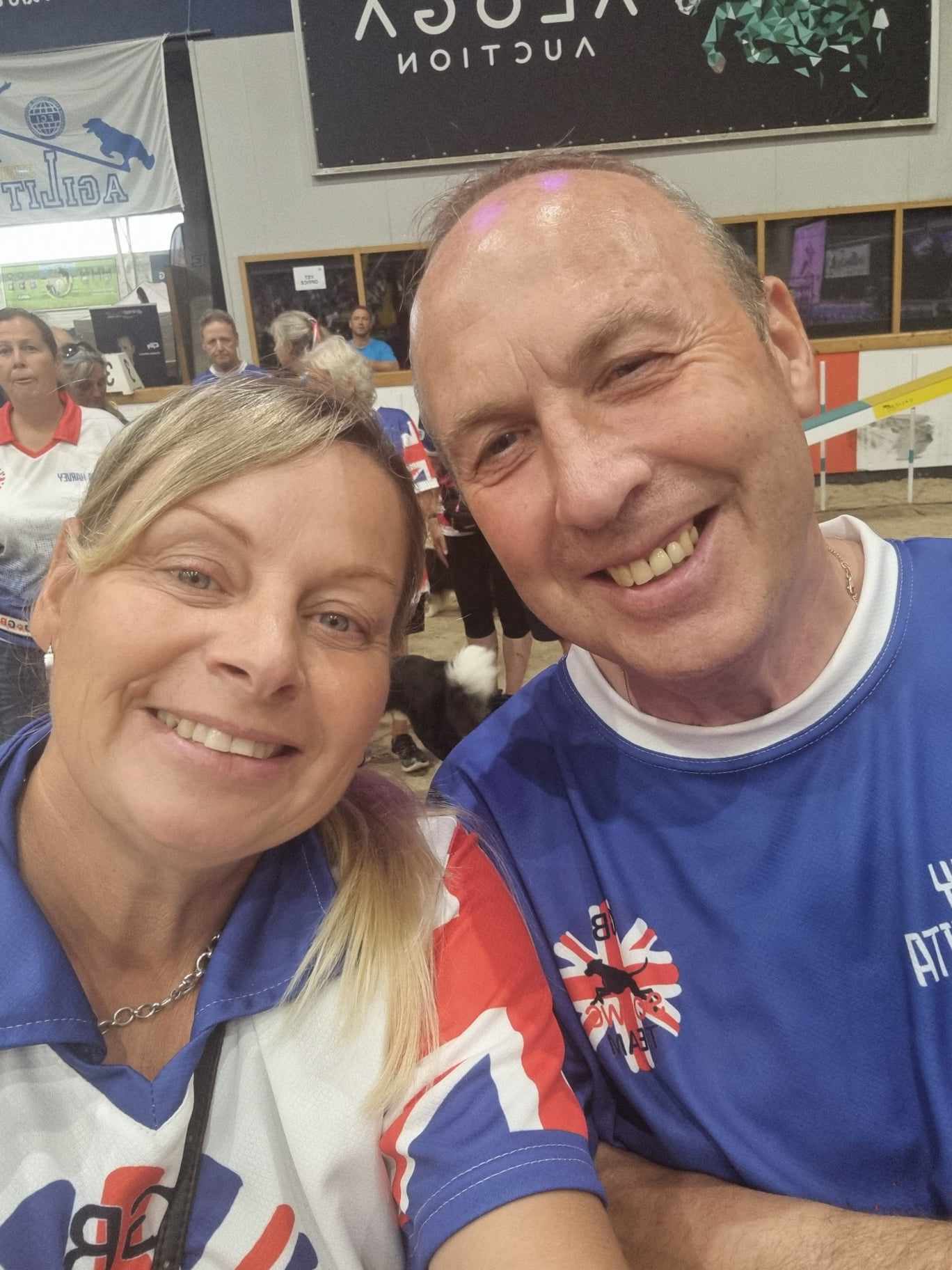 Then
there was the little matter of the training for both me and the dogs so we would
be able to cope with whatever we were going to face over there. I do all
my own dog training, but it is also important to train with others so that you don't get
stale and are always progressing. FCI courses are totally different from British
ones and demand many different skills for both the dog and the handler. There is
also a whole set of different competition rules to learn. These are things you
just can't do at the last minute so we constantly trained. Then
there was the little matter of the training for both me and the dogs so we would
be able to cope with whatever we were going to face over there. I do all
my own dog training, but it is also important to train with others so that you don't get
stale and are always progressing. FCI courses are totally different from British
ones and demand many different skills for both the dog and the handler. There is
also a whole set of different competition rules to learn. These are things you
just can't do at the last minute so we constantly trained.
We found out who was judging so we could study their
previous courses. Then we set them up and worked the dogs over them to get the
feel for the judge's particular style and the kind of tests they like
setting. It's a bit like preparing for exams and revising. Doing previous exam
papers hopefully means no surprises on the day!
Our dogs are physically maintained by a lovely lady
Sue Julian who is a witch with them. Louise takes them every month as well as
just before international competitions to sort out any underlying injuries or
niggles because, remember, they can't tell us is something is wrong! Well, not
in words, but they do it with their performance and movement.
Additionally, there was the little matter of keeping
me fit. I take I-Flex from Ace Canine to maintain my joints and movement, which
is brilliant in addition to doing my running exercises. Having played
semi-professional football and cricket for the first 35 years of my life, the
old joints have taken a hammering so now I'm 66, I need all the help I can get.
I must be doing something right as I'm still going.
In
the run up to major international competitions, we do fewer shows and try to
pick only the ones which will be complementary to what we are going to face
overseas. We don't stop completely competing as this would be detrimental for me
as my football and cricket taught me. I need to keep match fit. Otherwise, if I
stop completely, I would get rusty.
This was all before we left.
Getting there
In the past, we've travelled via the ferry
over the North Sea from Harwich to Hoek of Holland or places in North or Eastern
Europe such as Denmark and Czech Republic. On this occasion, we took the Euro
Tunnel from Folkestone to Calais for the Sentower Arena in Belgium. As you
pay for all your travel costs, you need to choose your route wisely.
To get an early morning Channel crossing, it's usually
an unearthly start time like 3.30am. It's onwards from there, remembering to
drive on the right and not forgetting to reset the clocks and watches an hour
forward in British Summer Time. The time you lose an hour going out, you gain
coming home.
Pet Passport control is always a worry even if you're
sure that you have the correct documentation. Customs is always a fun event. It
can take ages having to go through both English and French customs, sometimes
getting pulled over for a full drugs search by one side or both of them.
Then it is a drive across Europe and finding the hotel
which we have to pay for as well along with all meals, drinks and parking. After
setting up our dog friendly room, we went to explore a bit to get our bearings
and see where to eat and exercise the dogs etc.
Before the start
of the competition, there were welcome drinks with the
team and a meal - that we had to pay for - to give us a chance to all get together
and bond prior to the event.
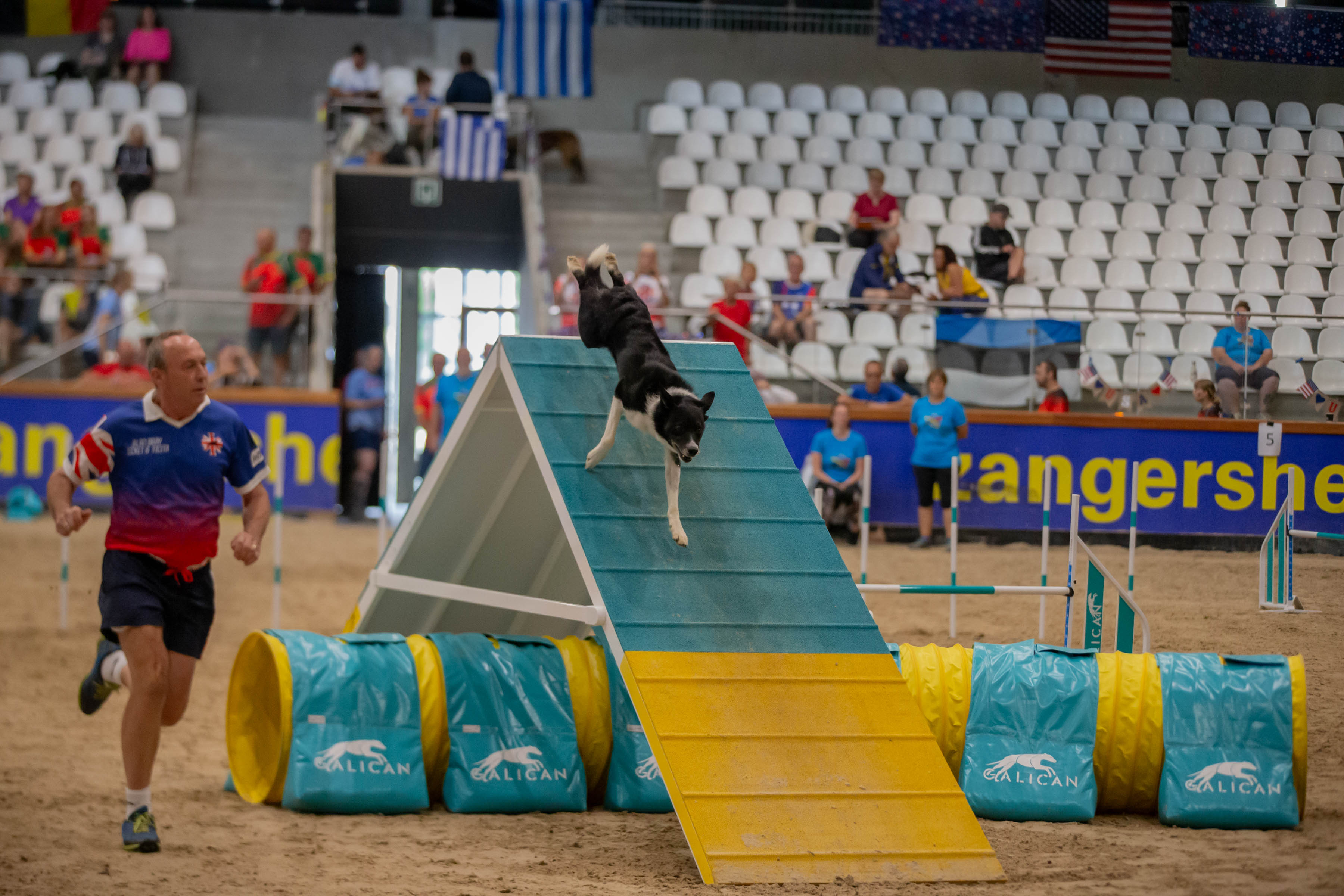 Let
the games begin Let
the games begin
The team
commitments start with formal training in the venue which is manic. The arena
was split into three identical rings with three different countries training in
each ring for anything between eight and 16 minutes in total for all your team and
that's your lot. So, don't do anything heroic just get your dog used to the
surface and equipment. Just make sure you do simple things as you don't want a
problem on the eve of competing.
Then it's a vet check, documents check and measuring
for those dogs not already having an FCI measure, followed by informal training
away from the venue to get us ready to compete.
There were three days of
competition during which time the atmosphere was electric with
four indoor rings with four different countries all chanting and blowing their
air horns, bells and heaven know what else in support of their teammates. It was
bedlam in there and the dogs needed a lot of visual and body language
support to get around the courses.
These were very long days though with course
walking at 7.00am - if you missed it, tough! You're not allowed to walk again. The
last day of the actual competitions finished at 10pm, a bit late for yours
truly.
We were lucky enough to win a full house of medals -
Bronze, Silver and Gold - of which we are very proud. The courses were very,
very tight compared to those in the UK. They are set at 7 metres maximum between each obstacle compared to ours at 10 metres. This meant that my large, powerful
Border Collie, Ticket, was constantly looking further forward than the next
obstacle which made it difficult to control him, but nevertheless we managed to
land the medals.
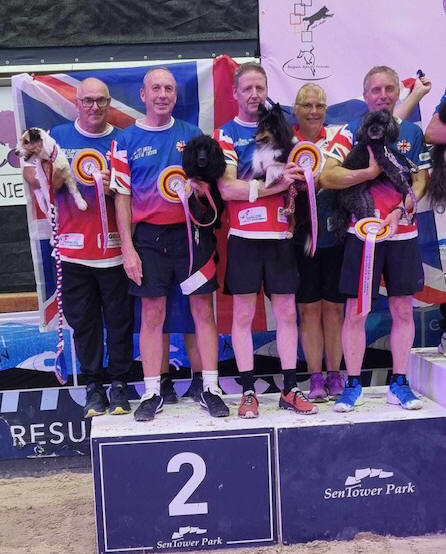 Three
days solid of competing with two dogs over 200+ meter courses takes its toll on
the old ankle and knee and hip joints as well as the feet. Thank goodness for
I-Flex which kept me going okay throughout the competition. Taking one capsule a
day really did help as I can remember the pain which I used to get when getting out of
bed in the morning and couldn't put my feet flat down on the floor before I
started taking it. Three
days solid of competing with two dogs over 200+ meter courses takes its toll on
the old ankle and knee and hip joints as well as the feet. Thank goodness for
I-Flex which kept me going okay throughout the competition. Taking one capsule a
day really did help as I can remember the pain which I used to get when getting out of
bed in the morning and couldn't put my feet flat down on the floor before I
started taking it.
Big mention to my Small dog height teammates Marc
Wingate-Wynne, John Clayton and Jason Smawfield-Huby who carried me when my
Cocker Spaniel was overawed with the indoor noise and wouldn't work. You guys
were brilliant. Thank you so much!
The FCI Worlds differ significantly from the European
Open Championships in format. The Euros are like our Championships with a
Jumping and an Agility qualifier and then a final run from scratch ran in
reverse order, whereas the Senior and Junior Open are the best of the combined
Jumping and Agility rounds with no final round.
Ticket, my Border Collie, worked beautifully with just
5f on the challenging Jumping course when he ran past a jump because he was
not used to the small ring size and 7 metre distances. I managed to not get an E
so finished a creditable 9th out of 85 dogs, but it was a really tall order
to get on the podium from there.
I knew that Ticket had to do a great run
on the Agility to order to catch the eight dogs ahead of us and thankfully he did,
blasting around the course winning by over a second and half to haul us into
Bronze position overall and an Individual Gold great stuff. What a good boy!
The top three from each class were introduced onto the
podium at prize giving with supporting team manager and national flag held
behind them for photographs and the relevant national anthem played which was
respected by all. All countries make a really big thing of this, and some provide
'team tunnels' for their award winning teammates to run under to the podium!
There were opening and closing ceremonies with each
country being introduced to the crowd and parading some with their own dogs as
well all holding their national flags. It was good to sing God Save the King
though!
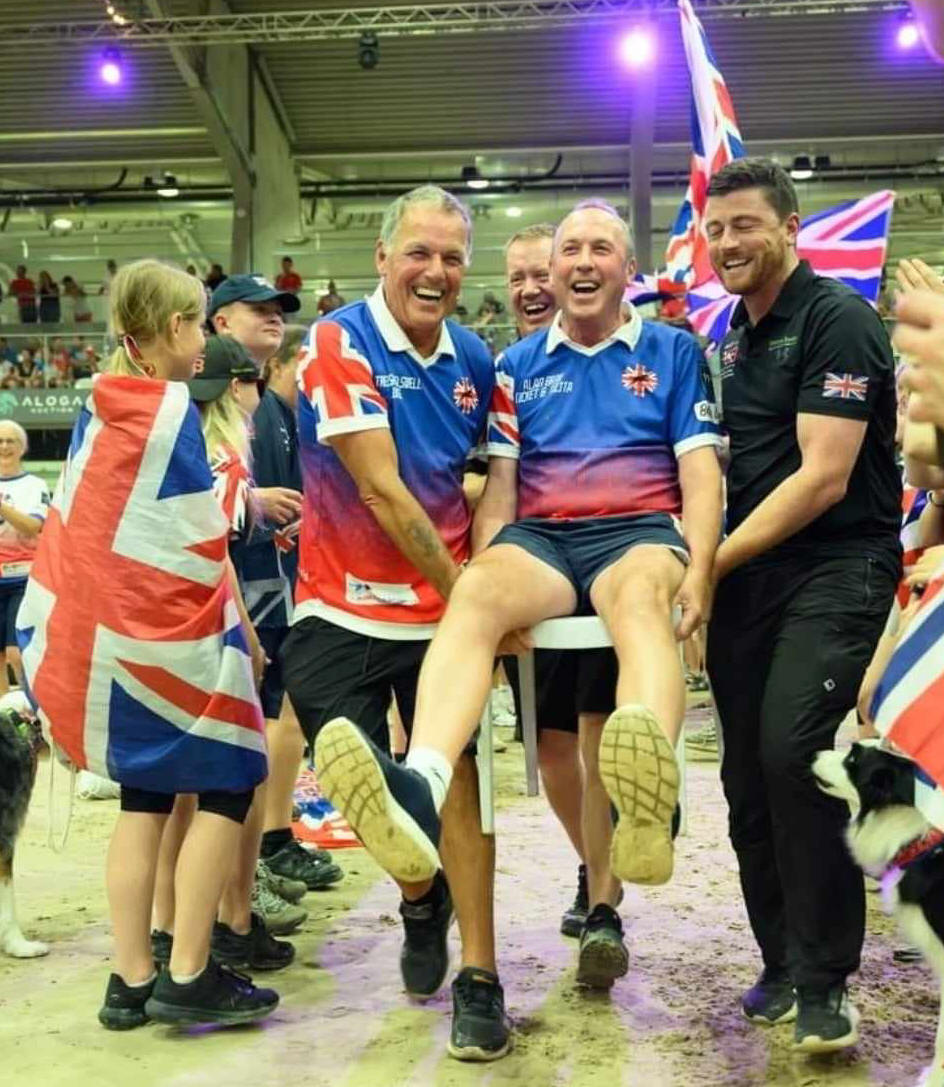 Because the presentations and
closing ceremony were taking so long, Louise brought a chair for me to sit on.
The guys carried me up to the podium and then casually dumped me onto the 1st
place tier, tipping me out, as it was a wheelbarrow. Thereafter, I was
known as The Chairman. Because the presentations and
closing ceremony were taking so long, Louise brought a chair for me to sit on.
The guys carried me up to the podium and then casually dumped me onto the 1st
place tier, tipping me out, as it was a wheelbarrow. Thereafter, I was
known as The Chairman.
Our
Juniors were competing at the same event. It was so good seeing our youngsters
doing really well and supporting us as well as each other.
Goodbye and thank you from The Chairman
Afterwards, there was the little matter of
packing and heading back to the Channel on Monday morning for the 1.15pm
train, hoping there wouldn't be any hold ups. Then it was going home to unpack and
wash everything so that we could go back to teaching again on Tuesday morning.
First of
all, thank you to Amy Louise Challis, Anne Challis and Andrew Challis for
looking after our dogs while we were away.
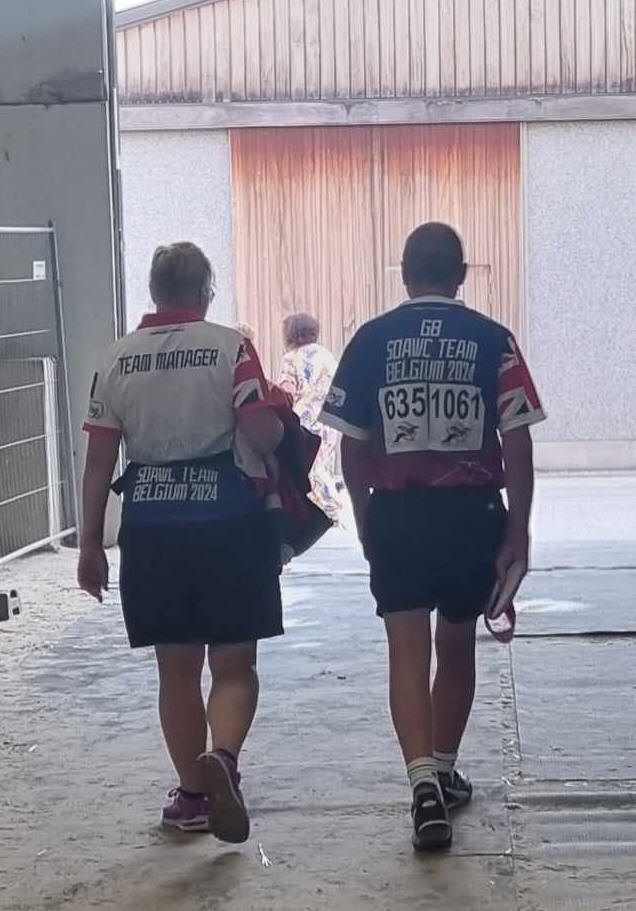 Next
a big thank you to Stacey Irwin Burns for all her help with Ticket since he was
a pup and Shannon Springford for our regular training sessions at the Dartford-based
Upanova Tigers venue. Next
a big thank you to Stacey Irwin Burns for all her help with Ticket since he was
a pup and Shannon Springford for our regular training sessions at the Dartford-based
Upanova Tigers venue.
Without our
Team Manager, Jackie Gardner, none of this would have happened and not
forgetting our
Ring Managers Bernadette Bay and Alison Gayton who ensured that we didn't miss
our runs. It can all be very confusing while you're waiting to go while trying to
keep up with what's going on but still concentrating on your dog and the course you
are about to run.
And
finally a huge thank you to my beautiful Louise for your help and support.
A sad return
While we were away, we did have a tragedy as on the first night there our
beloved Tesla Girl took ill and had to go to sleep which my mother-in-law Anne
Challis took care of. She and Lou bred her and brought her into the world so she
was with her at the end, but I do feel guilty that I wasn't there to hold her
when she went.
The house
is so empty without her. When I come home, I still expect to see her smile, head tilted to
the side with her ears pricked, saying hello.
 About
the author... About
the author...
Alan Bray
has vast experience both in judging and competing at international level. Over
his long and impressive agility career, he has won every domestic honour and
major final several times as well as a major final with different dogs and
different breeds and even heights. In addition, he has made five different dogs
up to Agility Champion.
As the owner of
Upanova Tigers, he has helped train others to achieve success at the highest
level by continuing to evolve training and handling methods and styles to suit
current course tests.
Alan
keeps his feet firmly on the floor though, saying that he is lucky to have so
many good friends in agility and to able to spend quality time with his
wife Louise and daughter Selena - both at training and shows.
Photo credit at
SOAWC: Paws off the Floor
First published 14th September 2024
| |
|